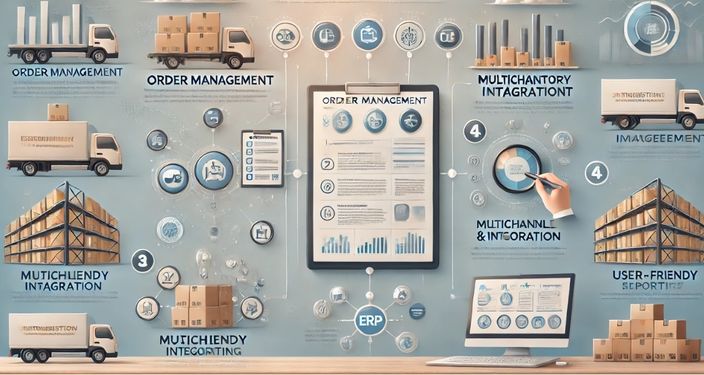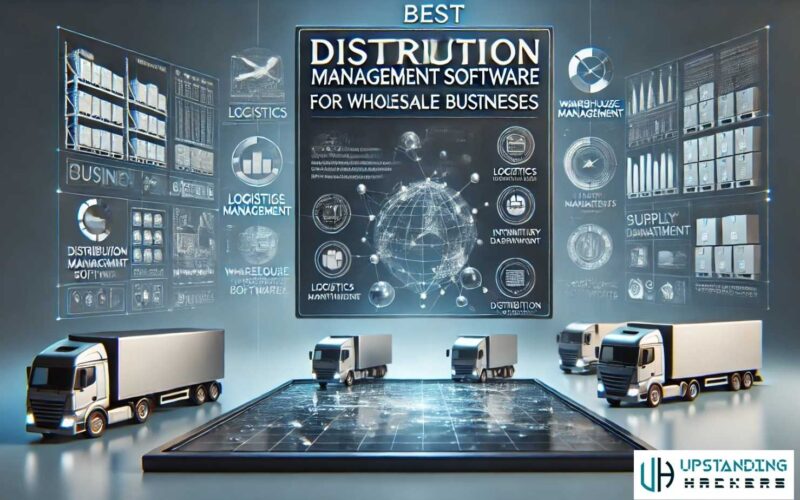Best Distribution Management Software for Wholesale Businesses in 2025
Distribution Management Software (DMS) plays a crucial role in the wholesale industry by streamlining operations, optimizing supply chains, and improving order fulfillment. In 2025, businesses are increasingly relying on advanced distribution management solutions to enhance efficiency, reduce errors, and ensure smooth multichannel distribution. As wholesale businesses face growing competition and shifting market demands, the right tool can significantly impact operational success.
Key Trends Shaping Distribution Software in 2025
- AI and Automation – More companies are integrating AI-driven analytics and automated workflows to reduce manual errors and improve decision-making.
- Cloud-Based Solutions – The shift to cloud-based DMS continues, offering better scalability, remote access, and reduced IT costs.
- Enhanced Data Analytics – Real-time insights and predictive analytics help businesses make data-driven decisions for inventory and sales forecasting.
- Omnichannel Capabilities – Wholesale businesses require seamless integration with eCommerce platforms, marketplaces, and retail partners.
- User-Centric Design – Software providers are prioritizing intuitive interfaces, ensuring ease of use for teams across various roles.
Key Features to Look for in a Distribution Management Software
Order Management
A comprehensive order management system is essential for efficient business operations. The right software should facilitate automated order processing, ensuring seamless transitions from order placement to fulfillment. Real-time tracking capabilities help businesses monitor order statuses, reducing delays and improving customer satisfaction. Additionally, seamless integration with multiple sales channels enables wholesalers to maintain a synchronized order management process across various platforms.
Inventory Management
Effective inventory management ensures that businesses maintain optimal stock levels, reducing the risk of overstocking or stockouts. A robust DMS should provide real-time inventory tracking, allowing businesses to monitor stock movements accurately. Automated stock replenishment helps prevent inventory shortages by triggering orders when stock levels are low. Multi-warehouse management capabilities enable businesses to oversee inventory across different locations, ensuring smooth distribution. The inclusion of barcode scanning or RFID technology enhances inventory accuracy, minimizing discrepancies and human errors.
Multichannel Integration
Multichannel integration is a critical component of a DMS, allowing wholesalers to connect their software with multiple sales and distribution channels. Integration with eCommerce platforms such as Shopify, Magento, and WooCommerce ensures that online and offline sales processes remain interconnected. A well-integrated system should also be compatible with ERP and CRM solutions, facilitating smooth data flow between departments and improving customer relationship management. The ability to link with marketplaces like Amazon and eBay expands the business’s reach and enhances sales opportunities.

SimplyDepo’s catalog management software includes seamless multichannel integration, allowing businesses to manage product catalogs from a single dashboard.
Analytics and Reporting
Advanced analytics and reporting features empower businesses to make informed decisions based on real-time data. A high-quality DMS should provide customizable dashboards that offer insights into key business metrics, such as sales performance, revenue trends, and demand forecasting. Comprehensive performance reports help wholesalers identify patterns, optimize their supply chain, and adjust their strategies accordingly. With predictive analytics, businesses can anticipate market fluctuations and plan their inventory and distribution processes more effectively.
User-Friendly Design and Scalability
User-friendly design and scalability play a vital role in the effectiveness of a DMS. An intuitive interface ensures that employees can navigate the system with ease, reducing training time and improving operational efficiency. Mobile accessibility enhances usability, enabling sales representatives and warehouse teams to manage tasks on the go. Scalability is another crucial factor, as businesses require software that can adapt to their growth without the need for significant modifications. A flexible and scalable DMS allows wholesalers to expand their operations while maintaining seamless functionality.
Top Distribution Management Software for Wholesale Businesses in 2025
SimplyDepo
Description: SimplyDepo is an all-in-one B2B wholesale solution designed to optimize field sales, order management, and distribution workflows. It’s known for its ease of use and powerful mobile and web applications.
Pros:
- Intuitive interface
- Mobile app for field reps
- Seamless B2B order processing
- Strong analytics and reporting
Cons:
- Limited integrations compared to ERP solutions
- Best suited for small to mid-sized wholesalers
NetSuite ERP
Description: A leading cloud-based ERP system that includes comprehensive DMS functionalities, NetSuite ERP is a top choice for medium to large enterprises.
Pros:
- End-to-end business management
- Strong financial and inventory tracking
- Customizable dashboards
Cons:
- Expensive for small businesses
- Steep learning curve
Acumatica Cloud ERP
Description: Acumatica is a cloud-based ERP offering robust distribution and inventory management features.
Pros:
- Scalable cloud solution
- AI-powered insights
- Flexible pricing model
Cons:
- Requires technical expertise for implementation
- Some features require additional costs
S2K Enterprise
Description: A powerful ERP system with distribution and warehouse management capabilities, S2K Enterprise is well-suited for larger wholesale operations.
Pros:
- Strong warehouse automation tools
- Advanced forecasting capabilities
- Industry-specific solutions
Cons:
- Complex setup process
- Higher pricing structure
DATASCOPE WMS
Description: A warehouse management system (WMS) designed for efficient inventory tracking and distribution.
Pros:
- Advanced inventory control
- Barcode scanning support
- Cloud and on-premise options
Cons:
- Limited accounting features
- Requires integration with ERP systems
B2B Wave
Description: A specialized B2B eCommerce platform that streamlines wholesale ordering and distribution.
Pros:
- Easy-to-use interface
- Strong eCommerce integrations
- Affordable for small wholesalers
Cons:
- Lacks advanced inventory management
- Limited customization options
Comparison Table: Best Distribution Software in 2025
| Software | Features | Pricing | Ideal Business Size | Pros | Cons |
| SimplyDepo | B2B sales, order management, Catalog management, AI analytics | Mid-range | Small to mid-sized | Mobile-friendly, easy to use | Limited integrations |
| NetSuite ERP | Full ERP, inventory, finance | High | Medium to large | Comprehensive solution | Expensive, complex |
| Acumatica | Cloud ERP, AI insights | Flexible | Mid-sized to large | Scalable, predictive analytics | Requires technical setup |
| S2K Enterprise | ERP, warehouse automation | High | Large enterprises | Advanced automation | High cost, complex setup |
| DATASCOPE WMS | Inventory tracking, warehouse management | Mid-range | Medium to large | Barcode scanning, cloud options | Needs ERP integration |
| B2B Wave | Wholesale eCommerce, order processing | Affordable | Small wholesalers | Easy to use, eCommerce-friendly | Basic inventory tools |
How to Choose the Right Software for Your Wholesale Business
Business Size and Scalability
Consider whether the software can grow with your business. Smaller businesses may prefer affordable, user-friendly options, while larger enterprises need comprehensive ERP solutions.
Industry-Specific Needs
Different industries have unique requirements. For example, FMCG businesses need fast-moving inventory features, while electronics wholesalers require advanced tracking tools.
Integration with Existing Tools
Ensure compatibility with your existing CRM, ERP, and eCommerce platforms to maintain seamless operations.
Cost vs. ROI
Compare pricing plans and assess the potential return on investment. Higher-priced solutions may offer greater efficiency and automation benefits.
Cloud-Based vs. On-Premise Solutions
Cloud-based software provides flexibility and remote access, while on-premise solutions offer greater control and security.
Customer Support and Training
Look for providers that offer strong customer support, onboarding assistance, and training resources to maximize software adoption.
Conclusion
Choosing the right Distribution Management Software in 2025 depends on business size, industry needs, and budget. SimplyDepo is an excellent choice for small to mid-sized wholesalers, while larger enterprises may benefit from robust ERP systems like NetSuite and S2K Enterprise. By evaluating features, integration capabilities, and cost-effectiveness, wholesalers can find the ideal software to optimize their distribution operations.
See Also: The Future of Marketing Tools: Trends & Must-Have Platforms










